SOON IT WILL BECOME URGENT TO END THE LOCKDOWN: ‘This is the worst it’s ever been’: L.A. Mayor announces city worker furloughs during State of the City address. When you lose your job, it’s an unfortunate necessity. When unionized Dem city workers lose their jobs, well . . .
Archive for 2020
April 19, 2020
AS A 14EEEE I’M GOING TO ORDER SOME OF THESE: Extra-Wide Sock Company King Size Men’s Comfort Fit Athletic Crew Socks.
AND NOT A MINUTE TOO SOON, EITHER: Coronavirus brings Europe’s borders back: The coronavirus has not just brought globalization to a standstill. The COVID-19 crisis also shows how fragmented united Europe actually is — not only relations between countries but between generations and classes. The class divide is the topic of my USA Today column tomorrow.
KAROL MARKOWICZ: Andrew Cuomo owes a genuine back-to-work plan to New Yorkers.
OPEN THREAD: If you’re feeling lucky you best not refuse. It’s your game the rules are your own, win or lose
WYNN RESORTS CEO CALLS FOR LAS VEGAS STRIP TO CONDITIONALLY REOPEN IN MID- TO LATE MAY. “He also laid out Wynn’s health and safety guidelines for reopening, which include allowing a maximum of four people to ride in an elevator at one time; and requiring guests to enter the resort through doors that are either propped open, are automated or manually operated by an employee.”
ROGER KIMBALL: Lockdown Theater Brings Hoopla and Amateur Epidemiologists.
An acquaintance of mine made what I think is an astute observation when he wrote that “Politicians and bureaucracies tend to respond to crises with theater. After 9/11 it was airport security theater. Following Corona it was lockdown theater. There’s some utility to it, but only some, there is much more hoopla.”
I agree, except for the “there’s some utility to it” bit. In my view, the TSA is 100 percent “airport security theater.” If we really wanted to be secure airline travel, we’d allow passengers to carry concealed weapons. A baddie pops up with a box cutter, pow, Mr. Smith in 11D puts his Beretta M9 to good use. No more baddie and the nice lady next to him gets to keep the box cutter as a souvenir.
How about lockdown theater? What good has it done? The main current of opinion favors the process if not necessarily the theater. In a particularly nauseating piece, even for The New York Times, our former paper of record notes today that the situation on the ground seems to be improving, but asserts that “The gains to date were achieved only by shutting down the country.”
* * * * * * * *
Since part of Lockdown Theater is that everyone has to play being an expert epidemiologist and talk knowingly about William Farr, R0, “patient zero,” and the like. It’s a bit like playing Ben Casey, if you remember him, or Dr. House if you’re a young ’un. You just bone up on a bit of the jargon, then mobilize it to heap contempt on anyone with whom you disagree politically. The best part is that not only do you get to sound like you know something about epidemiology, but also you get to imply that the object of your contempt is both wrong and a bad person for disagreeing with you.
Related! Queen’s Brian May says the coronavirus pandemic is meat eaters’ fault.
As Tom Wolfe once wrote, “An intellectual is a person knowledgeable in one field who speaks out only in others.”
Hopefully, Drs. Fauci and Birx will return the favor, plug into a couple of Marshall stacks, and play a wailing lead guitar battle at tomorrow’s briefing.
SOMETIMES, YOU GET WHAT YOU PAY FOR: A couple of weeks ago, I wrote to a professor friend who has written about using prizes to encourage research. I suggested that the government should offer a large prize for whoever invents a coronavirus vaccine, because there will be tremendous pressure for the inventor to not make a profit on its sale, which will dampen the incentive to invent it. Lo and behold, I see the below from JNJ. Call me crazy, but I’d prefer potential vaccine inventors to think that inventing one will be extremely profitable. Incentives and all…
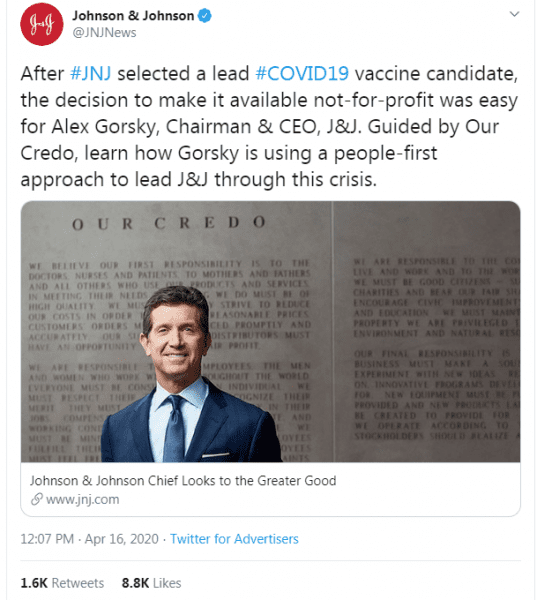
NEWS YOU CAN USE: Coronavirus masks: What’s the difference between N95 and KN95?
GOOD: Israel, US law-firms sue China for trillions over coronavirus. Mao wrote about paper tigers, but if he’d ever faced a major discovery operation he’d have had more respect for paper.
YOU’LL GET NOTHING, AND LIKE IT! Illinois Dems’ $41 Billion Demand Includes $10 Billion Pension Bailout That Has Nothing To Do With Coronavirus.
We need a GOP congress and president, and then we need to condition bailouts on splitting Illinois into two states: Chicago and the ring counties, and downstate.
THIS IS WHY NO ONE TRUSTS THE MEDIA (moved to top for update): New York Times:
On March 1, Joe Joyce and his wife, Jane, set sail for Spain on a cruise, flying first to Florida. His adult children — Kevin, Eddie and Kristen Mider — suggested that the impending doom of the coronavirus made this a bad idea. Joe Joyce was 74, a nonsmoker, healthy; four years after he opened his bar he stopped drinking completely. He didn’t see the problem.
“He watched Fox, and believed it was under control,’’ Kristen told me.
That weekend, I took my daughter to Universal Studios Florida. I was keeping up with the news, but no one was saying not to travel. No special precautions were being taken at the airport, on the airplane, at the hotel, or at Universal (I did have some sanitizer in my pocket, but I was apparently ahead of the curve). Both flights roundtrip to Orlando were full.
I had a conference scheduled at a major state university later than month. Well after March 1, we got a note via email that the university had consulted with experts at its medical center, and they were told that there was no reason to cancel the conference (though it was canceled later in the month). A local rabbi I know consulted with leading virus specialists in the area just before Purim on March 9, and they said to go ahead with holiday festivities. The first university to announce it was closing was Stanford, on March 6th.
Responsible reporters would note these sorts of thing, and point out that whatever the family believes, no important institutions or media networks were calling on people to stop traveling (or gathering) when the individual in question set off on his cruise. It turns out that we likely should have started serious social distancing at least a couple of weeks earlier than we did. But to blame our not doing so on “Fox News” is just batty.
UPDATE: The author of the Times article is Ginia Bellafante. In addition to the quote above, she goes on about Fox News coverage that took place *after* the man left on his cruise, which obviously could not have influenced him. Meanwhile, some Twitter sleuths have discovered her tweet below, which was in response to the stock market’s drop the previous day. I think it’s fair at this point to say that Ms. Ballafonte is personally responsible for every Coronavirus death in New York.
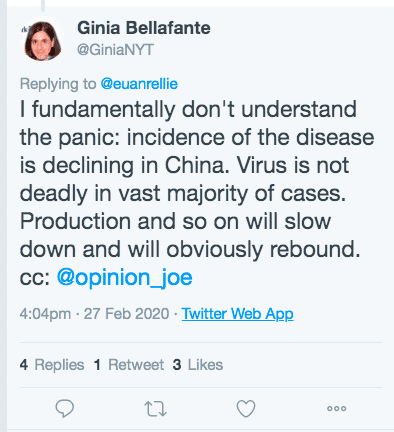
UPDATE (From Ed):
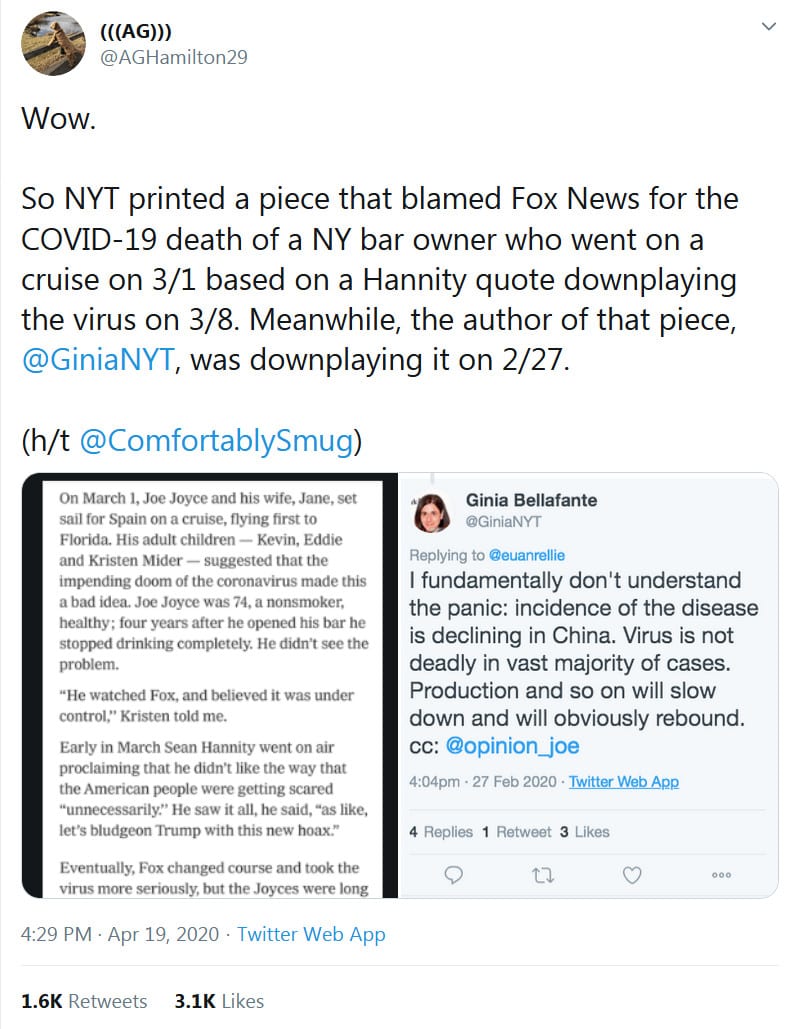
ANOTHER UPDATE (FROM GLENN): Yep.
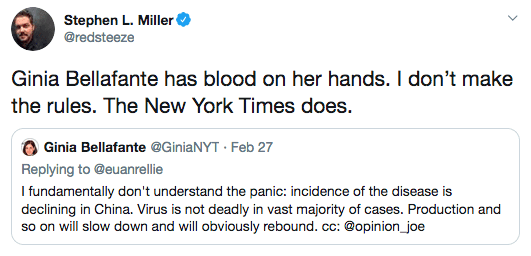
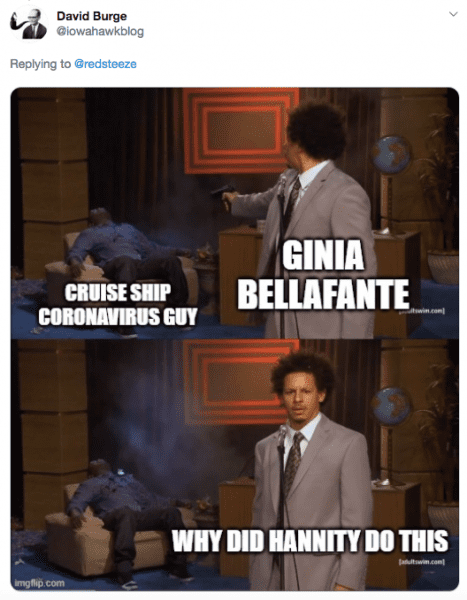
Advice to journalists: Don’t want people to think of you as garbage? Stop being garbage. If you can.
Plus, from the comments: “On March 1st, Joe Joyce and his wife, Jane, set sail for Spain. On March 2nd New York City Mayor Bill de Blasio was urging New Yorkers to get out and see a play. But yeah, I’d totally blame Fox News.”
(Updated and bumped.)
IF YOU WANT TO ENCOURAGE PEOPLE TO START BREAKING QUARANTINE, FLOAT TRIAL BALLOONS LIKE THIS: ‘Experts’ Trial Balloon: Hey, What If We Closed Grocery Stores While We’re At It?
GRETCHEN WHITMER MORPHED INTO JUDGE ELIHU SMAILS SO QUICKLY, EVERYBODY NOTICED: Michigan governor considers extending coronavirus restrictions because of protesters.
“You’ll get nothing and like it!”
LAYERS OF FACT-CHECKERS AND EDITORS:
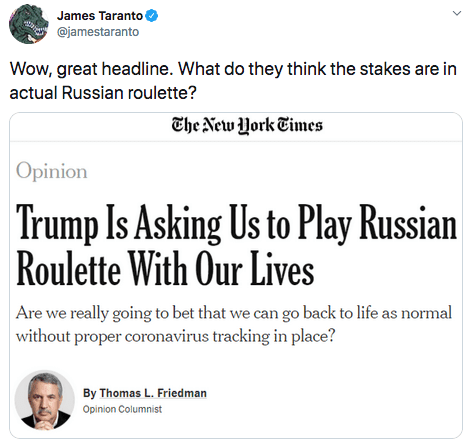
AT AMAZON, save in Health and Household.
“DEATH AMBASSADORS.” THAT’S A TERM THAT WILL STICK: Giuliani: China Sent Death ‘Ambassadors’ Around World.
China not only unleashed the deadly coronavirus pandemic on the world, but they “protected themselves” while doing it, closing down travel in their country from the city of Wuhan but permitting it internationally, according to former New York City Mayor Rudy Giuliani.
“They sent over a million people around the world – 1.5 million – almost like ambassadors carrying the disease,” Giuliani told host John Catsimatidis on Sunday’s “The Cats Roundtable” on 970 AM-N.Y.
“What’s wrong with them, John? They have no conscience. It’s really a tragedy. This is directly caused by the Chinese Communist government, and by the choices they made. Almost all of this could have been avoided, John.
“The whole world is kind of shut down for three weeks because of them,” he added.
Giuliani added a rebuke of the World Health Organization and its Director-General Tedros Adhanom Ghebreyesus.
“He’s in the pocket of China; he did everything China wanted,” Giuliani told Catsimatidis.
Well, that’s certainly true.
CHRISTOPHER DEMUTH: Trump Rewrites the Book on Emergencies: For the first time in U.S. history, an administration is responding to a crisis with deregulation and decentralization.
Washington’s response to the Covid-19 pandemic is upending one of the most durable patterns of American politics. Throughout history, national emergencies have led to a more powerful and centralized federal government and to the transfer of federal power from Congress to the executive branch. This time, the federal response rests largely on state and local government and private enterprise, with a wave of deregulation clearing the way. The Trump administration has seized no new powers, and Congress has stayed energetically in the game.
The historical pattern is powerful and might have seemed inevitable. In times of war, natural disaster and economic upheaval, action is king. The president and his officials and agencies can act with much greater dispatch than Congress can. They may be forgiven for crossing statutory or even constitutional boundaries—in a crisis, the test of legitimacy is perceived effectiveness. But emergency actions often set precedents for normal times.
Moreover, crises generate proposals for preventing their recurrence. These typically take the form of an agency that, with the benefit of hindsight, could have nipped the crisis in the bud. Positing an omnicompetent government authority is political misdirection: It elides the profound problems of uncertainty and conflicting information and interpretation that precede every catastrophe. That is a sure recipe for highly concentrated, discretionary power.
These tendencies were dramatically on display in the first two national emergencies of the 21st century, 9/11 and the 2008 financial collapse. In response to the 9/11 attacks, the Bush administration and Congress created two gigantic agencies with extraordinary powers and insulation from congressional control, the Department of Homeland Security and the Office of the Director of National Intelligence. Intelligence was centralized and bureaucratized; federal police powers were extended down to driver’s licenses and much else; the administration established wide-ranging surveillance programs.
In response to the 2008 crisis, the administration arranged corporate mergers and bailouts with only fig leaves of statutory authority. It spent hundreds of billions of dollars without congressional appropriation. These crisis expedients provided the template for the Obama administration’s unilateral responses to mere political frustrations—congressional inaction on its climate change, immigration and other legislative proposals. At the same time, the Dodd-Frank Act of 2010 commissioned an army of new regulatory authorities with unprecedented discretion and autonomy.
It is not only crises that propel the administrative state. Lesser events of the 2000s—accounting scandals and a spike in energy prices—also led to new layers of freewheeling federal power. But major emergencies have unfailingly been major inflection points.
Until now. In responding to the coronavirus, the Trump administration has confined itself to longstanding statutory authorities that have been invoked routinely in responding to lesser emergencies. President Trump has used the Stafford Act of 1988 to provide states with emergency financial assistance—but has deferred to their decisions regarding social confinement, business closures, testing and treatment. He has employed the Defense Production Act of 1950 to cajole manufactures to prioritize urgently needed medical equipment—but has relied primarily on consultation, coordination and publicity to coach a private-sector-led mobilization. He has declared a national emergency under the National Emergencies Act of 1976, which can potentially trigger extraordinary regulatory powers—but so far he has used it only for deregulatory purposes, waiving Medicare, Medicaid, Children’s Health Insurance and Health Insurance Portability and Accountability Act rules that restrict telemedicine and interstate medical practice.
Mr. Trump has received criticism from all sides for these measured responses. It is said, on the one hand, that he should aggressively commandeer state police powers and industrial resources to mount a uniform national response—and, on the other (sometimes by the same critics), that the crisis will sooner or later unleash the authoritarian ambitions Mr. Trump has supposedly been harboring all along.
His replies have been characteristically adamant. He has extolled his administration’s performance on the measures that are unarguably federal jurisdictions—restricting foreign travel, deploying the military’s medical resources, mobilizing production of materials in short supply and allocating them among states and cities, providing information on the spread of the virus and guidance on mitigation measures. He has been jealous of federal prerogatives and sharply critical of governors and business executives he regarded as uncooperative.
But mainly he has given pride of place to federalism and private enterprise—lauding the patriotism and proficiency of our fantastic governors and mayors, our incredible business leaders and genius companies, our heroic doctors and nurses and orderlies, and our tremendous truckers. By shouting out many of them by name and documenting their deeds on a daily basis, he has vivified the American way in action (once reluctantly aroused). When asked why he has not issued orders for nationwide home and business lockdowns, he has emphasized that the intensity of the epidemic varies widely and is best met by calibrated state and local judgments—and added pointedly that such steps would conflict with the Constitution.
What nonsense. Everyone knows that we have a living, breathing Constitution that adapts and changes to meet the needs of the time, defined as whatever the chattering class wants at the moment.
Plus: “The most striking aspect of the administration’s response has been its waiving or liberalizing of hundreds of regulatory requirements that would otherwise impede efforts to cope with the epidemic and ensuing shutdowns. The Food and Drug Administration has relaxed its extreme restrictions on the development and deployment of medical tests, equipment, drugs and vaccines. The Medicare and Hipaa waivers, along with the suspension by many states of their restrictions on out-of-state medical professionals, are allowing doctors and nurses to go where they are needed and to practice telemedicine. The Education Department is easing its micromanagement of school districts to facilitate online teaching and other initiatives. Teachers I know are enthusiastic about the cancellation of this year’s federal testing requirements—now they can actually teach their students instead of merely preparing them for tests.”
Most of these requirements — possibly all — should be permanently abolished.
“PAY ME.” Cuomo: ‘If You Want States To Reopen, We Need Funding.’
UPDATE: Wrong link before. Fixed now. Sorry!
NEWS FROM MY NECK OF THE WOODS: Protesters rally at Knoxville’s West Town Mall in favor of reopening economy. Judging from the photos they appear to be distancing.
Also: Coronavirus in Tennessee: 32 active Knox County cases, total recovered cases at 156. “The Knox County Health Department is reporting one new case of COVID-19 on Sunday, bringing the total case number to 192. There are now 32 active cases in the county as of April 19, down from 36 on Saturday. The total number of cases grew to 192 from 191. The total number of recovered cases rose to 156. . . . Of the 192 cases, 25 of them have resulted in hospitalization at any point during the illness.”
A FRIEND ON FACEBOOK COMMENTS:
Perhaps regional responses and attitudes about the continuing shelter-in-place can be explained, in part, by some startling numbers. In New York State you have a roughly 1/16,390 chance of dying in a car accident in any given year (using numbers from a few years ago). So far, your chances of dying of Covid-19 in NYS are an arresting 1/1072, or roughly 16X WORSE than dying in a car accident. In Texas, by comparison, your chances of dying in a car accident are much worse at 1/7820, but your chances of dying of Covid-19 (again, so far) are a very remote 1/58,824. Driving a car in Texas, a risk we take every day, is roughly 7X more dangerous than the Covid. Again, so far… None of this is to say that any given policy was the wrong approach (and, in any case, one can never derive “what ought” from “what is,” a basic precept lost in most public commentary just now). It might suggest, however, why civil impatience to loosen some restrictions is growing at different rates in different places.
Good point.
